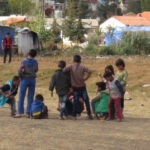Year: 2024
3rd International Conference on Sensitivity Research – Call for Submissions
The 3rd International Conference on Sensitivity Research will take place on May 23rd 2025 at the University of Surrey, United Kingdom (a 30min train ride from London).
Besides an exciting invited programme (to be announced in early 2025), we welcome submission of abstracts for a limited number of talks and posters on any recent research on sensitivity.
The Role of Sensitivity in Refugee Children’s Mental Health
Refugee children self-reporting high levels of environmental sensitivity are at risk for poorer mental health outcomes compared to less sensitive children.
Although self-reported sensitivity can be biased, we were unable to find any biological markers that could potentially serve as objective indicators of sensitivity.
How Sensitivity Shapes Our Reactions to Life’s Highs and Lows
Our individual degree of sensitivity to the world around us affects how we experience both good and bad events. In two studies, we explored how individuals with heightened environmental sensitivity respond more strongly to both stressful and positive experiences, suggesting practical ways to support mental health based on these insights.
How High Sensitivity Drives Sustainability: the Power of Awe and Nature Connectedness
Highly sensitive people are more connected with nature. In this study we show that awe, the admiration for nature, is an important factor in this connection.
We also demonstrate that higher sensitivity leads to more pro-environmental behaviours through nature connectedness and the capacity to value the future consequences of actions.
“No one likes me or wants to play with me!” Do highly sensitive adolescents feel peer acceptance and rejection more intensely?
Peers play a crucial role in the social lives of adolescents, but peer experiences may affect some adolescents more strongly than others.
In a study involving 1,207 adolescents, we revealed that adolescents who scored high on sensitivity felt better after imagining acceptance by peers but worse after imagining rejection by peers compared to their less sensitive counterparts.
Summary of the 2nd International Conference on Sensitivity Research
The 2nd International Conference on Sensitivity Research took place online on the 22nd of May, 2024. In this blog post, we summarize the meeting and highlight some key contributions from various sensitivity researchers.
Beyond Restless: Understanding Sleep Challenges for Highly Sensitive Persons
We investigated the relationship between sensory processing sensitivity and insomnia symptoms, testing the hypothesis that daily stressors would impact highly sensitive persons during nighttime.
We found that heightened sleep reactivity explains the relationship between sensitivity and sleep disruption. This study holds potential for helping sensitive people overcome their sleep problems.
An Overstimulated Consumer in a Highly Visual World: the HSP Trait
Research shows that people react differently to similar stimuli due to differences in their personality. This research study focuses on how people with higher sensitivity to external stimuli – commonly defined as Highly Sensitive Persons (HSPs) – react when exposed to adverts with excessive visual stimuli (i.e., colour, dynamic imagery, complex layouts).
Sensitive Adolescents with an Immigrant Background Benefit More from an Intervention Promoting Cultural Identity Development
In a randomized controlled trial conducted in Italy, we found that an 8-week school-based intervention targeting cultural identity development (i.e., Identity Project) was efficacious in promoting adolescents’ identity exploration. Highly sensitive adolescents with an immigrant background benefited the most from the intervention, providing support for the vantage sensitivity hypothesis.
Connecting the Dots between Sensitivity and Physical Health: the role of Psychological Stress
In our study on sensory processing sensitivity (SPS), health, and perceived stress, we observed that perceived stress acts as a mediator between SPS and poor physical health, particularly in a predominantly Hispanic population.
This suggests that prioritizing stress reduction may enhance the impact of SPS on physical health.










